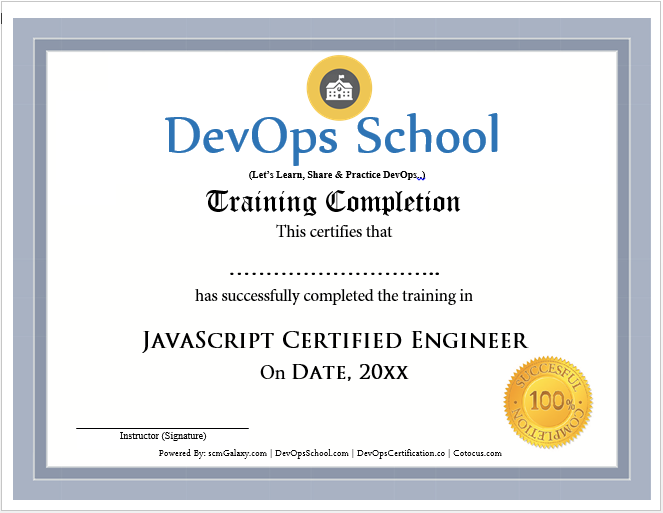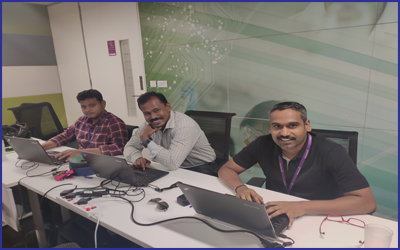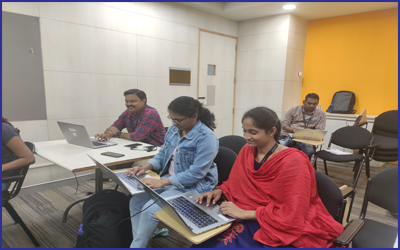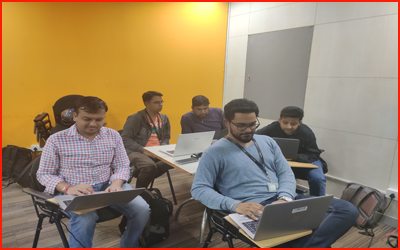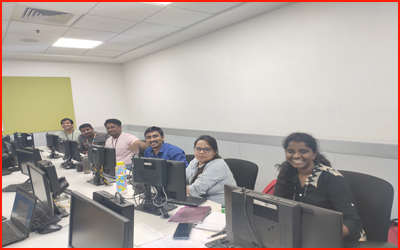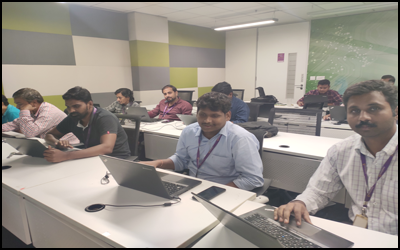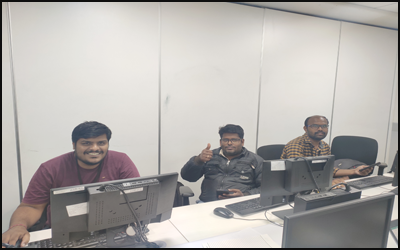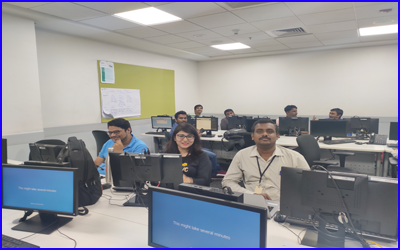8000+
Certified Learners
15+
Years Avg. faculty experience
40+
Happy Clients
4.5/5.0
Average class rating
What is OpenSearch?
OpenSearch is an open-source search and analytics engine, originally derived from Elasticsearch, which was developed by Amazon Web Services (AWS) as part of the AWS Open Distro for Elasticsearch. It aims to provide users with a powerful and scalable solution for searching, analyzing, and visualizing large volumes of data in real-time. OpenSearch offers features such as full-text search capabilities, real-time analytics, geospatial data handling, and integration with various data sources and visualization tools. It is designed to be highly customizable and extensible, allowing developers to tailor it to their specific use cases and requirements. One of the key aspects of OpenSearch is its open-source nature, which means that its source code is freely available for anyone to use, modify, and distribute under open-source licenses. This fosters collaboration and innovation within the community, as developers can contribute enhancements, fixes, and new features to the project.
Why OpenSearch is important?
- Open-source alternative: It provides a free, community-driven alternative to potentially pricier search and analytics solutions. This makes data analysis accessible to a wider range of users and organizations.
- Flexibility and Customization: Being open-source, OpenSearch allows for greater flexibility and customization compared to closed-source options. You can modify it to fit your specific needs and integrate it with other open-source tools.
- Active development: Backed by a large community, OpenSearch benefits from ongoing development and improvement.
- Future-proofing: With the licensing changes around Elasticsearch, OpenSearch offers a more secure path for future development, avoiding potential restrictions associated with proprietary software.
- Cloud-agnostic: Unlike Elasticsearch offered by AWS, OpenSearch can be deployed on various cloud platforms or even on-premises, giving you more control over your data infrastructure.
OpenSearch Course Feature
- Installation and Setup: A course on OpenSearch should cover how to install and set up the platform on various operating systems and environments. This includes understanding system requirements, deployment options, and basic configuration.
- Indexing Data: OpenSearch is designed to index and store large volumes of data efficiently. A course should cover how to ingest data into OpenSearch, whether it's through batch indexing, real-time streaming, or other methods.
- Search and Querying: OpenSearch provides powerful search capabilities, including full-text search, structured querying, filtering, and aggregation. A course should cover how to construct and execute different types of queries to retrieve relevant data from the index.
- Data Visualization: Visualizing data is essential for gaining insights from it. A course might cover how to use tools like Kibana, Grafana, or other visualization libraries to create interactive dashboards and reports based on data stored in OpenSearch.
- Security and Access Control: Securing data and controlling access to it is crucial in any data-driven application. A course should cover how to set up authentication, authorization, encryption, and other security features in OpenSearch to protect sensitive data.
- Scaling and Performance Tuning: As data volumes grow, it's important to understand how to scale the OpenSearch cluster and optimize its performance. A course might cover techniques for horizontal scaling, performance tuning, and monitoring cluster health.
- Use Cases and Best Practices: OpenSearch can be used for various use cases, including log analytics, monitoring, search applications, and more. A course should explore real-world use cases and best practices for deploying and using OpenSearch effectively.
- Integration with Other Systems: OpenSearch can integrate with other systems and tools in the data ecosystem, such as data lakes, data warehouses, messaging systems, and more. A course might cover how to integrate OpenSearch with these systems to build end-to-end data pipelines.
- Troubleshooting and Maintenance: Like any complex software, OpenSearch may encounter issues that require troubleshooting and maintenance. A course should cover common problems, debugging techniques, and best practices for maintaining an OpenSearch cluster.
- Community and Resources: Lastly, a good course should point learners to additional resources, such as documentation, forums, user groups, and community-contributed plugins and extensions, to continue their learning journey beyond the course.
OpenSearch Training objectives
- Understanding OpenSearch Fundamentals: Participants should gain a solid understanding of what OpenSearch is, its architecture, components, and how it differs from other search and analytics engines.
- Installation and Configuration: Trainees should learn how to install and configure OpenSearch on different platforms (e.g., cloud-based, on-premises) and understand the various configuration options available to optimize performance and security.
- Indexing and Data Ingestion: Participants should be able to efficiently ingest data into OpenSearch indices using various methods such as APIs, Logstash, or Beats. They should also understand best practices for data modeling and indexing to ensure optimal search performance.
- Search and Querying: Trainees should learn how to construct and execute complex search queries using the OpenSearch Query DSL (Domain-Specific Language) and understand advanced features like aggregations, filtering, sorting, and highlighting.
- Security and Access Control: Understanding how to secure OpenSearch clusters and data, including configuring authentication, authorization, encryption, and implementing other security best practices to protect sensitive information.
- Monitoring and Maintenance: Participants should learn how to monitor the health and performance of OpenSearch clusters using tools like Kibana and Elasticsearch Monitoring, and understand common maintenance tasks such as backups, upgrades, and scaling.
- Integration with Other Systems: Trainees should understand how to integrate OpenSearch with other systems and tools commonly used in the ecosystem, such as Kafka, Spark, Hadoop, or other databases and data sources.
- Troubleshooting and Performance Tuning: Developing skills to diagnose and troubleshoot issues that may arise with OpenSearch clusters, including identifying and resolving performance bottlenecks, indexing problems, and other common issues.
- Scalability and High Availability: Understanding how to design and configure OpenSearch clusters for scalability and high availability to ensure reliable and efficient operation, including strategies for load balancing, sharding, and replication.
- Use Case Specific Training: Tailoring training to specific use cases relevant to the organization or individual, such as log analysis, monitoring, e-commerce search, security analytics, or any other domain-specific applications.
OpenSearch Training objectives
- System Administrators and DevOps Engineers: These professionals are responsible for the deployment, configuration, and maintenance of IT infrastructure, including search and analytics platforms like OpenSearch. They would benefit from learning about installation, configuration, monitoring, and troubleshooting of OpenSearch clusters.
- Software Developers: Developers who build applications that require search and analytics functionality can benefit from understanding how to integrate OpenSearch into their applications using APIs and SDKs. They would also benefit from learning about data modeling, querying, and optimizing performance.
- Data Engineers and Data Scientists: Individuals working with large datasets for analysis, reporting, and machine learning can benefit from understanding how to use OpenSearch for data ingestion, indexing, and querying. They may also be interested in learning about advanced analytics features and integration with data processing frameworks.
- IT Managers and Decision Makers: Managers and decision-makers responsible for selecting and implementing search and analytics solutions within their organizations would benefit from understanding the capabilities and features of OpenSearch. This knowledge can help them make informed decisions about adopting OpenSearch and allocating resources for training and implementation.
- Security Professionals: Professionals responsible for securing IT infrastructure and data would benefit from learning about security features and best practices in OpenSearch, including authentication, authorization, encryption, and compliance with regulatory requirements.
- Business Analysts and Product Managers: Individuals responsible for analyzing data to make business decisions or define product features can benefit from understanding how to use OpenSearch for analyzing and visualizing data, generating insights, and supporting decision-making processes.
- Researchers and Academics: Researchers and academics studying search and analytics technologies, information retrieval, data mining, and related fields can benefit from learning about the architecture, algorithms, and use cases of OpenSearch for research and experimentation purposes.
- Consultants and Solution Architects: Consultants and solution architects who provide advisory and implementation services to organizations may need to understand OpenSearch to recommend suitable solutions and design architectures that meet client requirements.
- Students and Enthusiasts: Students studying computer science, data science, information retrieval, or related fields, as well as technology enthusiasts, may be interested in learning about OpenSearch for academic projects, personal projects, or career development.
- Anyone Interested in Search and Analytics: Individuals with a general interest in search and analytics technologies who want to expand their knowledge and skills in this area can also benefit from learning about OpenSearch.
Training methodolog of OpenSearch
OpenSearch, formerly known as Amazon Elasticsearch Service, is an open-source distributed search and analytics engine based on Apache Elasticsearch. It offers powerful search and analytics capabilities that can be used for various applications such as log and event data analysis, real-time application monitoring, full-text search, and more.
OpenSearch, formerly known as Amazon Elasticsearch Service, is an open-source distributed search and analytics engine based on Apache Elasticsearch. It offers powerful search and analytics capabilities that can be used for various applications such as log and event data analysis, real-time application monitoring, full-text search, and more.
- Documentation: OpenSearch provides comprehensive documentation that covers installation, configuration, and usage of the platform. This documentation serves as a primary resource for individuals and organizations looking to learn about OpenSearch.
- Tutorials and Guides: OpenSearch offers tutorials and guides aimed at users with varying levels of expertise. These resources typically cover specific use cases, best practices, and advanced features of the platform. Tutorials may include step-by-step instructions, sample code snippets, and hands-on exercises to help users understand how to use OpenSearch effectively.
- Online Courses: OpenSearch may offer online courses through platforms like Coursera, Udemy, or its own learning portal. These courses are designed to provide structured learning paths for individuals who want to deepen their understanding of OpenSearch. Courses may cover topics such as data indexing, querying, aggregation, visualization, and performance tuning.
- Community Forums and Support: OpenSearch has an active community of users, developers, and contributors who participate in forums, mailing lists, and chat channels. These community platforms serve as valuable resources for asking questions, sharing knowledge, and seeking assistance with OpenSearch-related issues. Active participation in community discussions can help users learn from others' experiences and gain insights into best practices.
- Hands-on Practice: One of the most effective ways to learn OpenSearch is through hands-on practice. Users can set up their own OpenSearch clusters, index sample data, perform searches, analyze results, and experiment with various configuration options. Hands-on practice allows users to gain practical experience and develop proficiency in using OpenSearch for real-world scenarios.
- Training Workshops and Events: OpenSearch may organize training workshops, webinars, and events aimed at educating users about the platform. These events provide opportunities for users to interact with OpenSearch experts, ask questions, and learn about the latest developments and best practices in the OpenSearch ecosystem.
Training methodolog of OpenSearch
- OpenSearch Documentation: The official documentation is an essential resource for learning about OpenSearch. It covers topics such as getting started, installation guides, configuration options, API references, and best practices. You can find the documentation on the OpenSearch website.
- Tutorials and Guides: OpenSearch offers tutorials and guides to help users understand how to use specific features and accomplish common tasks. These tutorials typically include step-by-step instructions and example use cases. You can find tutorials on the OpenSearch website or community forums.
- Online Courses: While there may not be official online courses specifically for OpenSearch, you can find relevant courses on platforms like Coursera, Udemy, and Pluralsight that cover Elasticsearch, which is the underlying technology behind OpenSearch. Courses on Elasticsearch cover similar concepts and can be valuable for learning about OpenSearch.
- Community Forums and Support: The OpenSearch community is active and helpful. You can join forums, mailing lists, and chat channels to ask questions, share knowledge, and seek assistance from other users and developers. The community forums are a great place to learn from others' experiences and stay updated on the latest developments.
- Hands-on Practice: Setting up your own OpenSearch cluster and experimenting with different configurations is an excellent way to learn. You can use sample datasets or generate your own data to index and analyze. Hands-on practice helps solidify your understanding of how OpenSearch works in real-world scenarios.
- Training Workshops and Events: Keep an eye out for training workshops, webinars, and events organized by the OpenSearch community or related organizations. These events provide opportunities to interact with experts, ask questions, and learn about advanced topics and best practices.
- Books and Online Resources: There are several books and online resources available that cover Elasticsearch, which, as mentioned earlier, is closely related to OpenSearch. While not specific to OpenSearch, these resources can still provide valuable insights into search and analytics technologies.
Training methodolog of OpenSearch
Here are some areas you might find interesting:
- Data Ingestion: Explore how OpenSearch ingests data from various sources like databases, logs, and file systems.
- Search Capabilities: Learn about different search query options, filtering techniques, and result sorting functionalities.
- Data Analysis with Aggregations: Discover how aggregations allow you to summarize and analyze large datasets within OpenSearch.
- OpenSearch Dashboards (Kibana): Explore how to create informative visualizations like charts and graphs to gain insights from your data.
- Security Features: Understand how to secure your OpenSearch cluster with access controls, user roles, and encryption.
Instructor-led, Live & Interactive Sessions
Duration |
Mode |
Level |
Batches |
Course Price at |
|---|---|---|---|---|
8 to 12 Hrs. (Approx) |
Online (Instructor-led) |
Advance |
Public batch |
24,999/- |
8 to 12 Hrs. (Approx) |
Videos (Self Learning) |
Advance |
Public batch |
4,999/- |
3 Days |
Corporate (Online/Classroom) |
OpenSearch Training and Certification Course |
Corporate Batch |
Contact US |
Agenda: OpenSearch Training and Courses Download Curriculum
OUR COURSE IN COMPARISON
| FEATURES | DEVOPSSCHOOL | OTHERS |
|---|---|---|
| Lifetime Technical Support | ||
| Lifetime LMS access | ||
| Interview Kit | ||
| Training Notes | ||
| Step by Step Web Based Tutorials | ||
| Training Slides |
- The career opportunities for skilled professionals are increasing significantly with huge scope for career growth.
- According to Indeed.com, the average salary of a OpenSearch professional is $177,530 per annum.
- OpenSearch being the leading data analytics tool is adopted by many MNCs worldwide. With this, the demand for OpenSearch professionals is gradually increasing - IDC.com
- IT Operations, IT Monitoring, IT Support, & Data Center teams.
- Business Analysts and Data Analysts who want to gain knowledge of OpenSearch development for creating Apps and Dashboards
- Understand OpenSearch concepts
- Apply various techniques to visualize data using multiple graphs and dashboards
- Implement OpenSearch in the organization to monitor operational intelligence
- Troubleshoot various application log issues using SPL (Search Processing Language)
- Implement indexers, forwarders, deployment servers and deployers in OpenSearch
- A basic understanding of JavaScript (beginner is fine)
- A basic understanding of Client Side vs Server Side (beginner is fine)
- Professionals seeking a transition to Cybersecurity domain from any background
- Cybersecurity professionals looking to enhance their skillsets
- Enthusiasts looking to enter the exciting world of Cybersecurity
OPENSEARCH CERTIFICATION
What are the benefits of "OpenSearch" Certification?
Certifications always play a crucial role in any profession. You may find some OpenSearch professional's, who will tell you that certifications do not hold much value; This certification demonstrates an individual's ability to generate complex searches, reports, and dashboards with OpenSearch's core software to get the most out of their data.
A OpenSearch Core Certified User can search, use fields, use look-ups, and create basic statistical reports and dashboards in the OpenSearch Enterprise or OpenSearch Cloud Platforms. This certification demonstrates an individual’s ability to navigate and use the OpenSearch Software.
FREQUENTLY ASKED QUESTIONS
To maintain the quality of our live sessions, we allow limited number of participants. Therefore, unfortunately live session demo cannot be possible without enrollment confirmation. But if you want to get familiar with our training methodology and process or trainer's teaching style, you can request a pre recorded Training videos before attending a live class.
Yes, after the training completion, participant will get one real-time scenario based project where they can impletement all their learnings and acquire real-world industry setup, skills, and practical knowledge which will help them to become industry-ready.
All our trainers, instructors and faculty members are highly qualified professionals from the Industry and have at least 10-15 yrs of relevant experience in various domains like IT, Agile, SCM, B&R, DevOps Training, Consulting and mentoring. All of them has gone through our selection process which includes profile screening, technical evaluation, and a training demo before they onboard to led our sessions.
No. But we help you to get prepared for the interviews and resume preparation as well. As there is a big demand for DevOps professionals, we help our participants to get ready for it by working on a real life projects and providing notifications through our "JOB updates" page and "Forum updates" where we update JOB requirements which we receive through emails/calls from different-different companies who are looking to hire trained professionals.
The system requirements include Windows / Mac / Linux PC, Minimum 2GB RAM and 20 GB HDD Storage with Windows/CentOS/Redhat/Ubuntu/Fedora.
All the Demo/Hands-on are to be executed by our trainers on DevOpsSchool's AWS cloud. We will provide you the step-wise guide to set up the LAB which will be used for doing the hands-on exercises, assignments, etc. Participants can practice by setting up the instances in AWS FREE tier account or they can use Virtual Machines (VMs) for practicals.
- Google Pay/Phone pe/Paytm
- NEFT or IMPS from all leading Banks
- Debit card/Credit card
- Xoom and Paypal (For USD Payments)
- Through our website payment gateway
Please email to contact@DevopsSchool.com
You will never lose any lecture at DevOpsSchool. There are two options available: You can view the class presentation, notes and class recordings that are available for online viewing 24x7 through our Learning management system (LMS). You can attend the missed session, in any other live batch or in the next batch within 3 months. Please note that, access to the learning materials (including class recordings, presentations, notes, step-bystep-guide etc.)will be available to our participants for lifetime.
Yes, Classroom training is available in Bangalore, Hyderabad, Chennai and Delhi location. Apart from these cities classroom session can be possible if the number of participants are 6 plus in that specific city.
Location of the training depends on the cities. You can refer this page for locations:- Contact
We use GoToMeeting platform to conduct our virtual sessions.
DevOpsSchool provides "DevOps Certified Professional (DCP)" certificte accredited by DevOpsCertificaiton.co which is industry recognized and does holds high value. Particiapant will be awarded with the certificate on the basis of projects, assignments and evaluation test which they will get within and after the training duration.
If you do not want to continue attend the session in that case we can not refund your money back. But, if you want to discontinue because of some genuine reason and wants to join back after some time then talk to our representative or drop an email for assistance.
Our fees are very competitive. Having said that if the
participants are in a group then following discounts can be possible based on
the
discussion with representative
Two to Three students – 10% Flat
discount
Four to Six Student – 15% Flat discount
Seven & More – 25% Flat Discount
If you are reaching to us that means you have a genuine need of this training, but if you feel that the training does not fit to your expectation level, You may share your feedback with trainer and try to resolve the concern. We have no refund policy once the training is confirmed.
You can know more about us on Web, Twitter, Facebook and linkedin and take your own decision. Also, you can email us to know more about us. We will call you back and help you more about the trusting DevOpsSchool for your online training.
If the transaction occurs through the website payment gateway, the participant will receive an invoice via email automatically. In rest options, participant can drop an email or contact to our representative for invoice
DEVOPS ONLINE TRAINING REVIEWS

Abhinav Gupta, Pune
(5.0)The training was very useful and interactive. Rajesh helped develop the confidence of all.

Indrayani, India
(5.0)Rajesh is very good trainer. Rajesh was able to resolve our queries and question effectively. We really liked the hands-on examples covered during this training program.

Ravi Daur , Noida
(5.0)Good training session about basic Devops concepts. Working session were also good, howeverproper query resolution was sometimes missed, maybe due to time constraint.

Sumit Kulkarni, Software Engineer
(5.0)Very well organized training, helped a lot to understand the DevOps concept and detailed related to various tools.Very helpful

Vinayakumar, Project Manager, Bangalore
(5.0)Thanks Rajesh, Training was good, Appreciate the knowledge you poses and displayed in the training.

Abhinav Gupta, Pune
(5.0)The training with DevOpsSchool was a good experience. Rajesh was very helping and clear with concepts. The only suggestion is to improve the course content.


